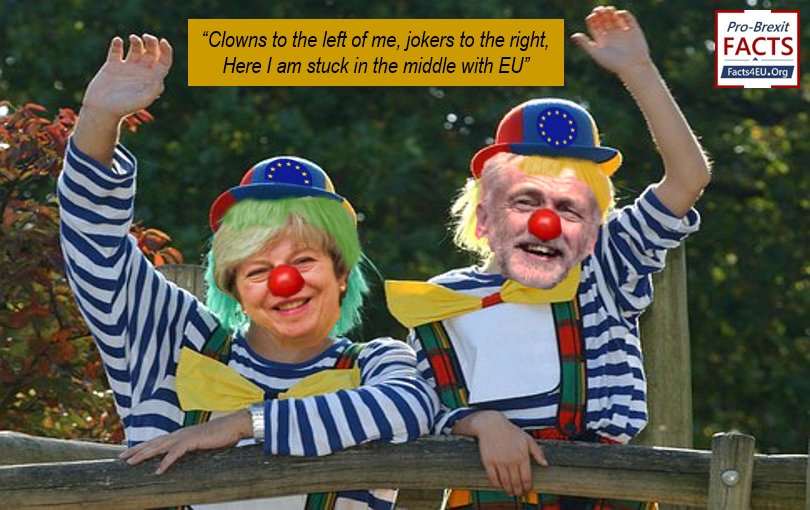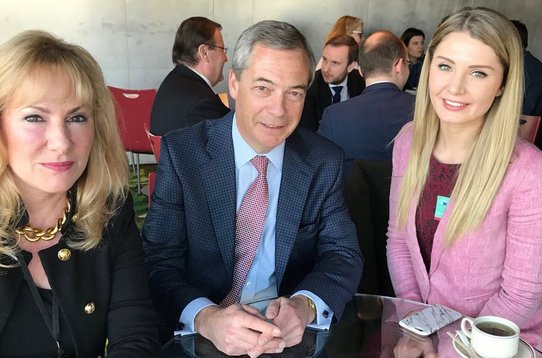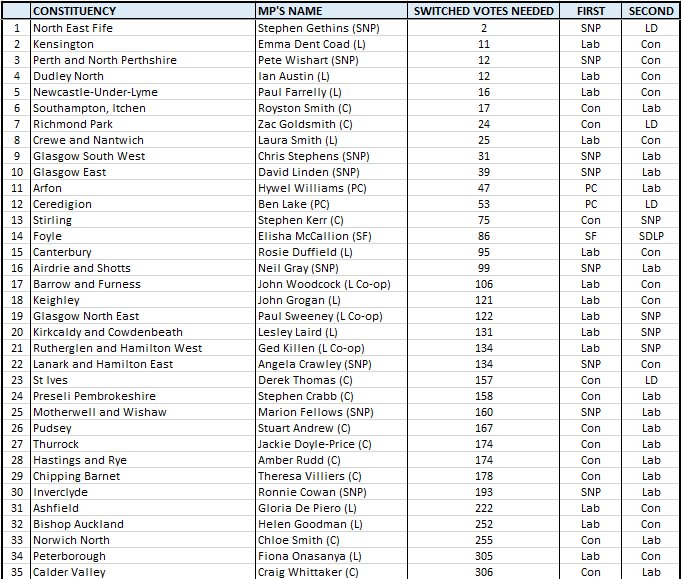THE FALL OF THE CONSERVATIVE & LABOUR PARTIES?
How Brexit may redefine the UK’s political map
A Brexit Facts4EU.Org discussion piece

© Brexit Facts4EU.Org 20191
MPs have usurped control of the order paper in the House of Commons for today. More accurately, they have taken control from the Government and handed it to the Speaker, arch-Remoaner John Bercow, for it is he who will decide which motions will be debated today in the House of Commons.
Technically, should any consensus emerge from today’s rather ludicrous proceedings, Mrs May can ignore the votes and continue on her merry way. In reality, she will be forced by political expediency to take some account of them, if she wishes to make any progress on Brexit.
Progress on anything has not, of course, been Mrs May’s strong point so we shall just have to wait and see.
The ‘indicative votes’
Frankly, who cares which motions the biased Bercow chooses to be debated today? Out of the seven-odd possibilities, only one of them represents Brexit – and that is leaving without an overarching agreement with the EU.
The others are all various forms of Remain, dressed up as only politicians can do.
Today we look at a different question for the near future.
Whither the two main parties?
Will Brexit prove to be the end of Conservative and Labour governments which have dominated the UK Parliament since the days of Ramsay Macdonald in the 1920s?
For almost a century the United Kingdom has mostly been ruled by an alternating Conservative or Labour government. Exceptions to this rule have occurred but are rare – the national government during World War Two, for example, and the coalition Con/LibDem government of David Cameron of 2010-2015.
For nearly one hundred years we have all become used to being ruled by either Conservative or Labour governments.
First past the post
At this point we should remind our international readers that the UK has a ‘first-past-the-post’ electoral system, whereby the candidate with the largest number of votes in each constituency is elected. In many parts of the UK there is strong support for one party and its candidate secures more than 50% of the votes. In many other areas, however, a candidate can be elected by a minority of the electorate provided they win more votes than any other candidate.
This electoral system automatically favours the larger parties, and in particular the Conservative and Labour parties. Over the years it has proved almost impossible for a new party to make any inroads. We are of course talking about the UK Parliament. Different circumstances prevail in Scotland and in Northern Ireland, but these haven't affected which of the Conservative or Labour parties form the UK Government, although one could argue that the current Government is propped up by the 10 DUP MPs from Northern Ireland.
The interesting question is how the electorate will react at the next election, with the majority who voted to leave seeing their dream taken away – in whole or in part.
A plague on both your houses?
In the last three years we have seen a steady increase in the number of emails we receive from readers who tell us they can no longer support either of the two main parties. And let’s be clear, (as our PM is fond of saying), many of these people have supported one of the two main parties all of their lives.
Imagine if Brexit is not delivered. Right now this seems the most probable outcome given our Remainer House of Commons and Remainer-dominated Cabinet. In this event what will happen to the Conservative and Labour vote at the next election?
The Wipe-Out Scenario
Given our first past the post electoral system it is never easy to make predictions about upsets, but let’s just take one possible scenario.
Let’s say that Brexit isn’t delivered by our elected politicians in any meaningful sense. 17.4 million people voted for something and were told that if they did, it would be delivered. A significant number had never been motivated to vote before. Yet they now find that what they voted for is denied to them.
Some of these voters may decide never to vote again.
Many, many more voters will not only feel betrayed, but they will be so angry that they will vote for any party which promises Brexit. A ‘no ifs, no buts, just Brexit’ party. Formerly ‘safe’ Conservative and Labour seats will suddenly become vulnerable.
Professor Sir John Curtice’s usual analysis of so-called ‘swing seats’ at election time on the BBC then becomes a total guessing game.
The rise of the Brexit machines
A raft of new political parties has sprung up in the last couple of years, such as the Time Party, the Democrats and Veterans Party, and For Britain. We have also seen the resurgence – almost reinvention - of some others, such as UKIP and the SDP. Naturally they get almost no coverage on the BBC or other mainstream media, because they are pro-Brexit.
It is possible to imagine the leaders of these parties starting to talk to each other, ahead of any general election. Such talks are always going to be difficult. That doesn’t mean they won’t happen.
If these parties cooperate in any significant way, it’s possible that parliamentary constituencies could be divided up, with one pro-Brexit party being chosen to fight each particular seat. In many seats this would decimate the vote for the Labour or Conservative candidate.
What about Nigel?
No discussion of Brexit politics could exclude ‘Mr Brexit’, as President Trump calls him. This week Mr Farage has taken over as leader of the new Brexit Party. In reality he was always the de facto leader, but his role is now official.
The one thing we can all agree on about Mr Farage is that he has name recognition.
Photo right: Nigel Farage with British MEP Janice Atkinson and conservative commentator Lauren Southern, banned from the UK by the British government.

The other thing we know is that his departure from UKIP was not perhaps the most amicable. Still, politics is about the art of the possible to paraphrase Von Bismarck, so who knows what might happen?
The vulnerability of the incompetents
To leave you with some facts, in January we published our research on the vulnerability of MPs to a shift in public opinion.
The summary was: If only 3,000 voters in each constituency switched their votes to the 2nd placed candidate, over 200 incumbent MPs would lose their job.
Brexit Facts4EU.org Summary
The vulnerability of MPs’ jobs
- 80 MPs could be unseated if under 1,000 voters switched at the next general election
- Over 200 MPs could be unseated if just 3,000 voters switched votes in their constituencies
- Cabinet ministers and shadow ministers are in the 50 most vulnerable seats
Below are the top 35 most vulnerable MPs to switched votes at the next election, followed by links to the tables down to the top 245. This is over one-third of the House of Commons.
© Brexit Facts4EU.Org 2019
Please note that these tables are not available elsewhere and are the result of the Brexit Facts4EU.Org team pooling different datasets from the Electoral Commission and from Parliament itself, in order to create something simple to read and understand.
Other observations
We believe that both main parties are heading for a drubbing at the next election. We may see the first signs of this at the local elections in May.
We sincerely hope that Amber Rudd, with a majority of a few hundred, will lose her seat in Hastings and never be elected to Parliament again. By the way, we understand from a source that she has block-booked a top London restaurant for a private function – is she inviting potential donors for her leadership bid?
If so, a lot of money will be wasted. The grass roots of the party will never, ever vote for the Conservatives with her as leader.
A new landscape
In broad terms we can foresee a fundamental re-shaping of the political landscape in the United Kingdom. Whilst the new terrain is hazy, we have a strong feeling that things will never be the same again.
We’re interested in your thoughts.
1 P.S. Some readers may want to remind themselves of the great band Stealers Wheel, who recorded “Stuck in the Middle with you”. Go to Amazon and buy the album. Great memories.
Brexit Facts4EU.Org, 27 Mar 2019
Since before the EU Referendum, Brexit Facts4EU.Org
has been the most prolific researcher and publisher of Brexit facts in the world.
Supported by MPs, MEPs, & other groups, our work has impact.
We think facts matter. Please donate today, so that we can continue to ensure a clean Brexit is finally delivered.
Paypal Users Only - Choose amount first
Quick One-off
Monthly



Something to say about this? Scroll down for reader comments